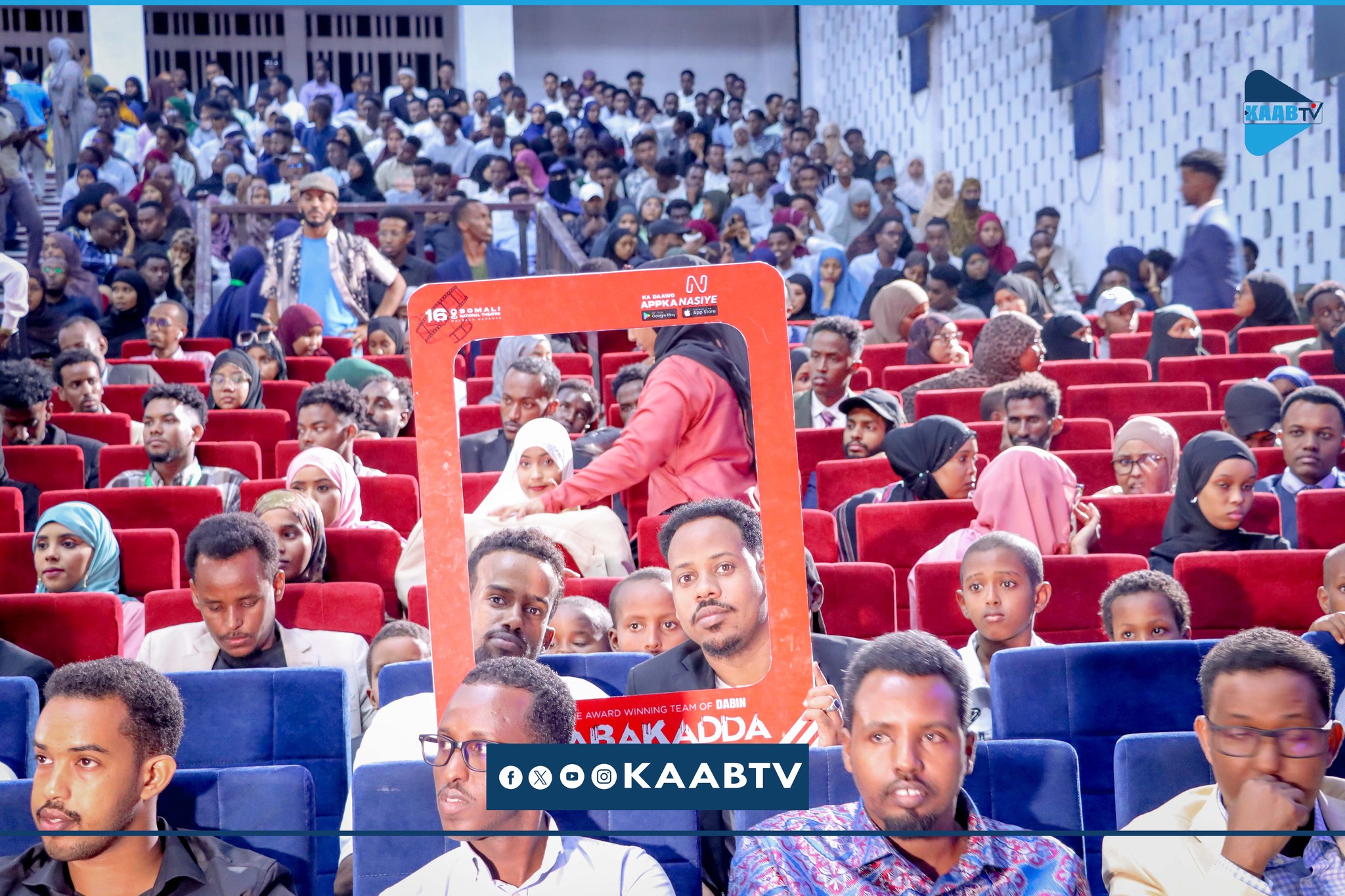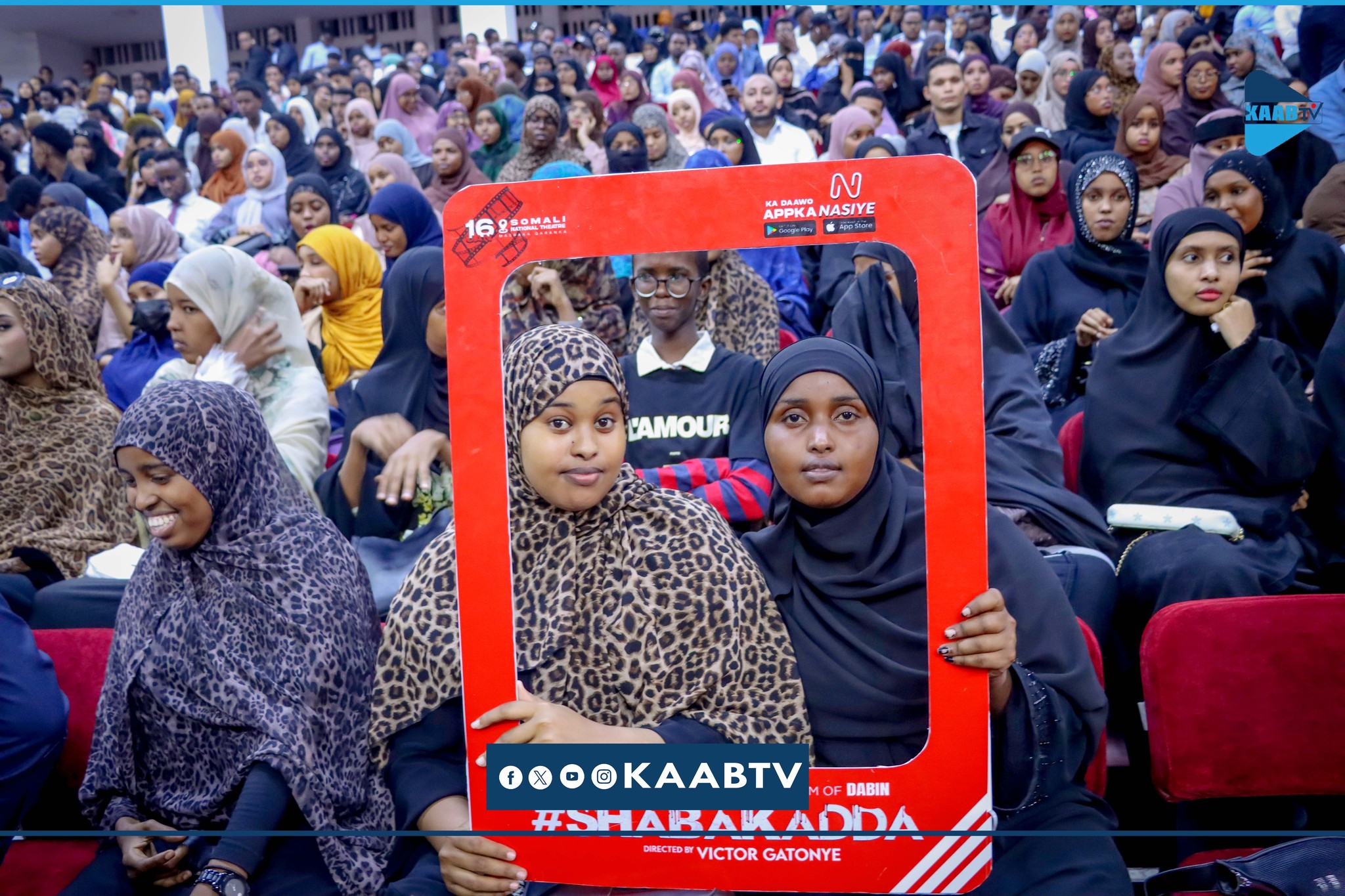MOGADISHU (Kaab TV) – After the collapse of the Somali central government, the National Theatre, located at the heart of Mogadishu, fell into neglect for decades. However, Friday night marked a transformative moment—a night unlike any seen in the past 30 years.
Over two thousand young Somalis gathered at the Mogadishu National Theatre for a film screening, an event that signaled both hope and a return to cultural expression.
The film, Shabakadda (literally meaning “The Network”), was not just a cinematic production made in a country ravaged by civil war, terrorism, and the rise of criminal networks—as its storyline portrays—but also a testament to the resilience and bravery of its creators.
The actors, many of them young women, presented a narrative that tells a different and inspiring side of Somalia.
Produced by a local producers known as Masrax Production, the drama series carried a powerful message, addressing critical issues such as abuse of power, corruption, tax theft, abuses in local hospitals, and the exploitation of children through organ trafficking.
One particularly chilling line from the film encapsulated the severity of the problem: “One kidney costs US$ 80,000, and two will cost US$ 160,000. Don’t worry about the money. It is important that this work is done,” uttered by a character to depict the underground networks involved in kidnapping individuals for their organs in Mogadishu.
A problem few dare to speak about
Despite the widespread nature of the problem, few dare to speak about it openly.
“When we witnessed numerous incidents, such as missing children—some being reported in the media, others found deceased, and some discovered with missing body parts—we decided to create a story about it,” said Mohamed Hassan Ashraf, one of the film’s co-producers.
For Ashraf and his team of producers, the subject matter was harrowing and frightening, yet the local youth who attended the screening on Friday saw it as an opportunity for awareness-raising.
“Myself and thousands of youth gathered here to watch the film at the National Theatre. We have seen the first episode, and it was beautiful. In the beginning, the film started off normally, but by the end, it became much more interesting,” said Idiris Alteeso, a Mogadishu-based social media influencer.
For others, like Mohamed Ali, the film’s significance extended beyond the narrative itself.
“It was exciting. It shows how Somalia is making progress in the filmmaking industry,” he said, highlighting the evolving talents of local Somali filmmakers.
The revival
Poetry, songs, and concerts have long played a significant role in Somali history, serving as vital tools for communication, cultural expression, and national identity.
Public concerts, especially those held at iconic venues like the Somali National Theatre, historically brought people together during the 1970s and 1980s, celebrating Somali heritage and fostering a sense of belonging—a nostalgia cherished by many elderly Somalis today.
Events at the National Theatre have often blended traditional and modern art forms—even within Somalia’s conservative society—bridging generations and raising awareness about social causes.

However, during the civil war, many artists and actors fled the country in search of safety and opportunities elsewhere.
This mass exodus disrupted the once-vibrant arts scene, particularly at venues like the National Theatre, which had been a hub for music, theater, and cultural performances. As a result, Somalia’s rich cultural heritage suffered, leaving young people without access to the traditional art forms that shaped previous generations.
“I have seen amazing scenes here that I was not expecting. I had only heard about the theatre before, but tonight it’s a unique and exciting experience,” said Hafsa Hilkas, a young TikToker born after the Somali Civil War.
Yet, Friday night’s event signaled a revival.
A significant portion of the film’s cast, including those playing pivotal roles, were women.
For Anfa Aden Abdi and Maryama Abdiaziz, two of the female actors in the film, this was a long-time dream come true.
“I played a major role in the first episode, and people watched it with interest. I hope the audience will be able to see all 26 episodes of the series,” Anfa told Kaab TV shortly after the screening ended. “Being a woman actor was my dream, and I wanted to test it. I am confident now. I want to encourage other women who aspire to become film actors that they can do it too.”

“Tonight, something extraordinary happened here. I am thrilled that Masrax Production made our dream come true,” said Maryama. “I am happy to have played the role of the woman involved in human organ trafficking in the film to shed light on this huge problem affecting our communities.”
The night was not only a celebration of Somali talent but also a powerful reminder of the potential of storytelling to drive awareness and spark dialogue about pressing social issues.
With films like Shabakadda, Somalia’s creative minds are paving the way for a brighter future in the arts, while reclaiming their cultural identity and rewriting the narrative often associated with their country.


